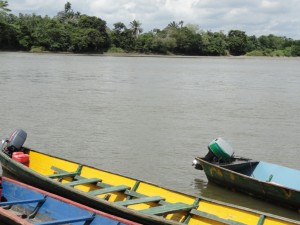I want to share with you a story about a woman whose circumstances are somewhat different than what most of us are used to. About a month ago we saw her for the first time in the Clinic at San Lorenzo. She came to see us because she had been bleeding heavily from her uterus. Her hemoglobin was 6.4 (normal for a woman is 12 – 14). We gave her some medication to try to stop the bleeding and some iron to help treat her anemia. We talked with her about surgery to remove her uterus – but obviously that would not be possible until her anemia improved.
As most of you know, the Clinic is located near the Colombian border. We have many Colombian patients, some who now live in San Lorenzo, and others who make the trip to the Clinic from their homes in Colombia. Lorena lives along a river in Colombia.

The Mira River in Colombia
She travels about two hours to get to the Clinic. She came in for a follow-up visit today. Her hemoglobin is improving (now at 10.8) and although she is still bleeding, it is better controlled. She is eager to schedule her surgery, so we made plans for early December and talked with her about the cost of her surgery.
She and her husband have forested land in Colombia, and they could easily sell some of the timber to pay for her surgery. They have a problem however. The guerrillas have planted mines all over their land to prevent them from felling their trees. They are unable to even enter this part of their property for fear of setting off the explosives.
Today she only had money to pay for her trip back home and a single blood test that we need for her surgery. We helped her with the two medicines that she needs to continue to take until her surgery. She and her husband have resources, but they are unable to convert those resources into the money they need for her surgery.
We will still plan for her surgery in December. She will come back at the end of November and let us know what arrangements she has been able to make. If needed we will provide economic assistance so that she will be able to undergo her surgery.





